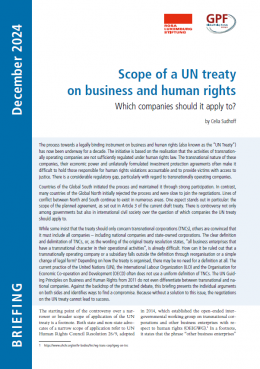The process towards a legally binding instrument on business and human rights (also known as the “UN Treaty”) has now been underway for a decade. The initiative is based on the realisation that the activities of transnationally operating companies are not sufficiently regulated under human rights law. The transnational nature of these companies, their economic power and unilaterally formulated investment protection agreements often make it difficult to hold those responsible for human rights violations accountable and to provide victims with access to justice. There is a considerable regulatory gap, particularly with regard to transnationally operating companies.
Countries of the Global South initiated the process and maintained it through strong participation. In contrast, many countries of the Global North initially rejected the process and were slow to join the negotiations. Lines of conflict between North and South continue to exist in numerous areas. One aspect stands out in particular: the scope of the planned agreement, as set out in Article 3 of the current draft treaty. There is controversy not only among governments but also in international civil society over the question of which companies the UN treaty should apply to.
While some insist that the treaty should only concern transnational corporations (TNCs), others are convinced that it must include all companies – including national companies and state-owned corporations. The clear definition and delimitation of TNCs, or, as the wording of the original treaty resolution states, “all business enterprises that have a transnational character in their operational activities”, is already difficult. How can it be ruled out that a transnationally operating company or a subsidiary falls outside the definition through reorganisation or a simple change of legal form? Depending on how the treaty is organised, there may be no need for a definition at all. The current practice of the United Nations (UN), the International Labour Organization (ILO) and the Organisation for Economic Co-operation and Development (OECD) often does not use a uniform definition of TNCs. The UN Guiding Principles on Business and Human Rights from 2011 do not even differentiate between transnational and national companies. Against the backdrop of the protracted debate, this briefing presents the individual arguments on both sides and identifies ways to find a compromise. Because without a solution to this issue, the negotiations on the UN treaty cannot lead to success.
Scope of a UN treaty on business and human rights
Which companies should it apply to?

